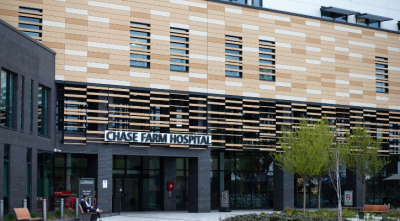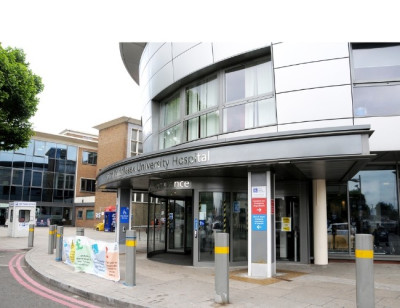Gastroenterology is the study and treatment of the digestive system and digestive problems, including diseases of the intestines, liver and biliary tree, and pancreas.
Our gastroenterology service provides a wide range of secondary care services to patients from north central London and tertiary care to regional, national and international patients.
At the Royal Free Hospital, services include general gastroenterology clinics for routine, urgent and cancer referrals, GI physiology, endoscopy diagnostic services and multi-diagnostic clinics in conjunction with University College London Hospitals.
The service also provides specialist scleroderma clinics, an inflammatory bowel disease/ nutrition service and an interventional endoscopy service which is internationally recognised.
Gastroenterologists at the Royal Free Hospital also deliver the highly specialised neuroendocrine tumour service.
The vision of the gastroenterology service is to be an integrated clinical and academic centre providing excellence in clinical outcomes, patient experience, research and teaching.
Barnet Hospital
Outpatient enquiries: 020 8370 2588
Chase Farm Hospital
Outpatient enquiries: 020 8370 2588 Endoscopy booking team: 020 3758 2017
North Middlesex University Hospital
General enquiries: 020 8887 3047
Endoscopy: 020 8887 2642, 020 8887 3938, or 020 8887 2277
Email: northmid.
Royal Free Hospital
Outpatient enquiries: 020 7443 9757
Endoscopy booking team: 020 7794 0500
Louise Ryan gastrointestinal physiology unit
Tel: 020 7830 2923
Email: rfh-tr.
Monday to Friday, 9am to 5pm
Referrals are welcomed from local GPs and tertiary referrals from any other hospital.
All patients are referred by letter from their GP or from other specialists seeking a further opinion. Referrals can also be made via the NHS e-Referral Service (e-RS).
The centralisation of colorectal services has not changed the referral patterns for GPs or other referrers to the service. Patients can continue to be referred to a particular consultant at a particular hospital.
To avoid delay, GP referrals should be addressed to a colorectal consultant surgeon or a named consultant surgeon.
Please note, the endoscopy department at the Royal Free Hospital does not accept direct access referrals to the endoscopy department. However, GPs can refer to the one-stop dyspepsia clinic for direct access upper gastroscopy procedure via paper or e-RS referrals.
Referrals to the gastroenterology team will be reviewed by a clinician and one of the following next steps will take place:
- You will receive an outpatient appointment at one of our hospitals.
- You will receive an appointment for a test or an investigation before your first outpatient appointment. This will mean faster diagnosis and treatment.
- You and your GP will receive a letter explaining how best to manage your symptoms. One of our clinicians has reviewed your symptoms and does not think you need to attend an outpatient appointment.
A referral from your GP will not automatically lead to an outpatient appointment at one of our hospitals.
Further information about what to expect when you are referred to the Royal Free London can be found on our outpatient appointments page.
If you have any questions about your referral, please contact:
Royal Free Hospital: rf.
Barnet Hospital and Chase Farm Hospital: rf-tr.
Louise Ryan unit referrals
The majority of gastrointestinal physiology tests are not first line tests and patients will usually already be under the care of a consultant within one of our hospitals.
Once the referral from your GP is received by the hospital, it will be reviewed by a senior gastroenterology consultant.
The consultant will use the information provided to direct your care in the most efficient way possible.
Our team may:
- write back to your GP with a recommendation for a course of treatment
- arrange an endoscopic procedure, blood test or scan at the hospital
- arrange an outpatient appointment for you
If you have symptoms that concern you, such as a change in bowel habit or you notice blood in your stools, it is important you see your GP as soon as possible.
Your GP will refer you to a specialist at a hospital of your choice. They will discuss the type of referral they are making, which will depend on your symptoms. Referrals are guided by clear criteria that your GP will discuss with you.
Once you have been referred, you will be seen as an outpatient and you will have the opportunity to discuss your symptoms with a consultant who will make an appropriate plan for your treatment. This might be for you to have further investigations such as a colonoscopy or CT virtual colonoscopy.
Getting a diagnosis
The next stage will depend on what is shown by these investigations.
You may be referred on to another doctor or team. You may also be allocated a specialist nurse whose role it is to support you as you progress through a treatment pathway, or if no further treatment is required you may be discharged.
You will be kept informed of this process throughout, and you will receive a copy of all correspondence between the hospital and your GP.
If a diagnosis of cancer is made, your case will be discussed in a weekly meeting with radiologists, oncologists surgeons and nurses who specialise in the treatment of cancer. They will make a plan for your treatment that will then be discussed with you.
You will have support from the colorectal cancer nurse specialist and our Macmillan cancer information and support centre.
Currently, target patients are seen either in consultant-led clinics or, increasingly, nurse-endoscopist-led one-stop dyspepsia clinics, which provide triage, consultation and diagnostic testing to rule out cancer, or to indicate further investigation.
The neuroendocrine tumour (NET) unit at the Royal Free Hospital has an international reputation for the management of neuroendocrine tumour patients.
We work within a multidisciplinary team and aim to enhance the prospects for treatment by a combination of clinical and laboratory research.
Our services can be accessed through a number of routes, depending on what symptoms you describe to your GP.
You will usually be referred for investigations, such as:
- endoscopy
- CT colonoscopy
- other radiology
- gastrointestinal physiology tests
Endoscopy is the use of a long, thin, flexible camera to investigate the gastrointestinal tract via the mouth (oral) or back passage (rectal).
There are many reasons why you may need an endoscopy, and it is often preferable to non-invasive alternatives such as scans or blood tests, for the following reasons:
- Endoscopy allows for direct views of the affected areas of the gastrointestinal tract.
- Samples (biopsies) can be taken to provide definitive diagnosis of many conditions.
- Treatment can be carried out via the endoscope during the appointment.
If your GP thinks you need an endoscopy, they will refer you to a specialist in the gastroenterology or colorectal surgery department, who will assess you in clinic and arrange an endoscopy if it is necessary.
The endoscopy unit at the Royal Free Hospital is on the lower ground floor nearest the Pond Street entrance. The unit comprises of three procedure rooms, with individual changing and toilet facilities, and an eight-bed recovery area.
As well as the main waiting room, the unit has a separate area for relatives waiting for patients to be discharged, and a private consultation room.
The endoscopy unit has one room equipped with radiographic image intensifier equipment to allow the team to carry out X-ray guided procedures, and we have a large team of endoscopists trained to carry out both diagnostic and interventional procedures.
The unit routinely carries out the following procedures:
- gastroscopy
- colonoscopy
- flexible sigmoidoscopy
- transnasal endoscopy
- bronchoscopy
- endoscopic retrograde cholangio-pancreatogram (ERCP)
- endoscopic ultrasound (EUS)
- endobronchial ultrasound (EBUS)
- placement of nasojejunal (NJ) feeding tubes
- percutaneous endoscopic gastrostomy/jejunostomy (PEG/PEJ)
- polypectomy/endoscopic mucosal resection (EMR)
The unit also carries out a number of advanced procedures, some of which are only performed by a handful of hospitals in the UK. These include:
- balloon dilatation
- oesophageal stenting
- biliary stenting
- confocal laser endomicroscopy
- double-balloon enteroscopy
- endoscopic submucosal dissection (ESD)
The endoscopy unit at Chase Farm Hospital is on the lower ground floor, Zone A.
There is a reception and waiting area as well as 16 pods and five theatres. Each pod has ensuite facilities.
The team carry out diagnostic and therapeutic endoscopic procedures from the purpose-built endoscopy suite. More than 10,000 endoscopic procedures are performed each year, including:
- upper gastrointestinal (GI) endoscopy
- flexible sigmoidoscopy and colonoscopy
- percutaneous endoscopic gastronomy (PEG)
- upper and lower GI stent insertion
Specialist nurses
The inflammatory bowel disease (IBD) nursing team consists of two clinical nurse specialists and administrative support, in the form of an IBD secretary and biologics multidisciplinary team coordinator.
The nurse specialists provide information, advice and support, as well as run nurse-led clinics and a patient access advice line.
Some specific aspects of the service provided are:
- telephone and email advice line (non-urgent service)
- disease and treatment options
- drug treatments
- pregnancy and IBD
- advice during a flare-up of your disease
- monitoring of patients receiving medications such as immunomodulators (eg azathioprine) and biological therapies (eg Infliximab)
The Royal Free London has collaborated on a film which showcases how patients can have a bigger say in the care being provided to them.
The short film follows patients with two main forms of IBD, Crohn’s disease and ulcerative colitis, working alongside clinicians and managers, to help make the experience of receiving care better.
This is part of work being done at our trust to use the latest clinical evidence to ensure all our patients have access to the best and most innovative treatments the NHS can offer, across our hospitals.
A group of patients came together to collaborate with staff in regular meetings to help redesign the way care is provided. Watch the film below to find out more.
Our gastroenterology adolescent transition clinic is for patients between the ages of 16 and 18.
This specialist clinic provides paediatric patients with extra support to develop and gain independence and responsibility for their own health, before they move to the adult service at the age of 18.
The gastroenterology transition team is based at the Royal Free Hospital and includes paediatric and adult consultants and nurse specialists.
The Louise Ryan gastrointestinal (GI) physiology unit is based on the lower ground floor of the Royal Free Hospital.
It is a nurse-led specialist investigation unit which provides a range of GI physiology (diagnostic) tests. It is a tertiary referral centre and also has a private practice element.
The Louise Ryan Unit offers a full range of GI physiology tests/interventions using state-of-the-art equipment.
The following websites provide support and information you may find useful.
- Bowel Cancer UK: the UK’s leading bowel cancer charity.
- Crohn’s & Colitis UK: the leading charity in the UK for Crohn’s disease and ulcerative colitis.
- Circa: the leading charity in the UK for children and young people with inflammatory bowel disease.
 Translate
Translate




